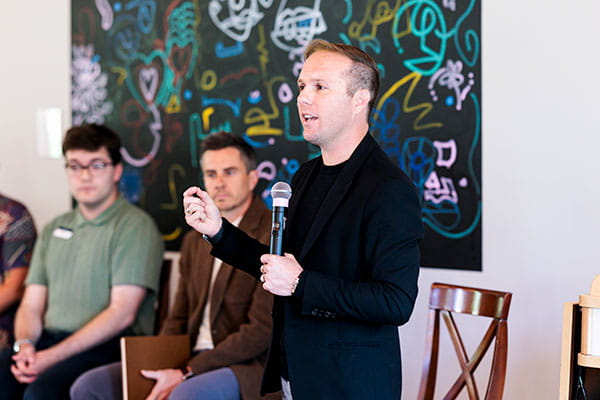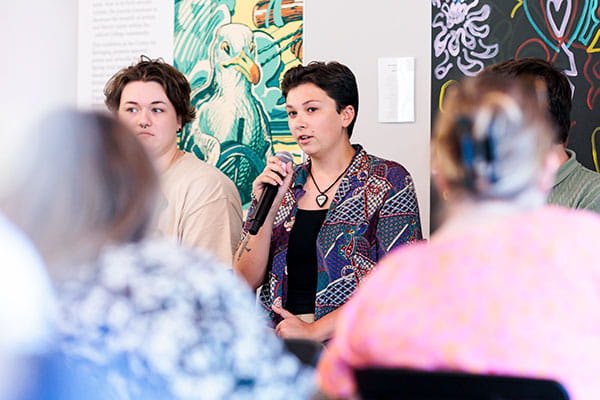Ahead of the national observance of National Coming Out Day, members of the Endicott College community gathered for an intimate lunch and panel discussion on October 7 to celebrate courage, authenticity, and the power of visibility.
Hosted by the Center for Belonging, the event featured students, faculty, and staff who shared their personal stories of coming out and reflected on what it means to live openly in today’s world. Acting President Dr. Bryan Cain moderated the conversation, which was introduced by Vice President and Chief Diversity Officer Brandi Johnson.
“This is the first time that we’ve done this event this way—with a lunch and a panel of extremely brave people willing to share their stories,” said Johnson in her welcome remarks. “I hope you enjoy this fabulous afternoon.”
For Dr. Cain, the event’s purpose went beyond storytelling—it was about affirming why visibility and understanding matter.

He explained that coming out often represents a profound moment of uncertainty, especially in relationships where unconditional love and acceptance are assumed to be secure.
“It’s that one time in our life as members of the LGBTQ+ community when we face the potential that the unconditional love and support from our family could be in question,” he said. “That’s why this is so important.”
Dr. Cain also shared his own story of coming out to his father as a young adult in Michigan. He recalled avoiding a family reunion and his father confronting him about it. To his surprise, he received nothing more than support from his family.
“He said, ‘Why would you think that things would change? We’re here. Nothing’s different,’” he recalled. “For this to come out of the mouth of a truck driver who barely got through high school in a very conservative town was a major moment.”
As the panelists spoke, a shared theme emerged: the role of community in fostering a sense of belonging. Whether finding support through professors, peers, or campus programs, each story reflected the power of affirmation and connection.
Student panelist Reece DesRochers ’26 credited their Endicott experience with helping them live authentically. “I came to Endicott and was surrounded by so many wonderful people,” they said. “The community that I’ve built here—my close friends—they have kept me going. They’re the reason I can still be happy and be myself.”

Similarly, performing arts major Eamon Arthur ’26 emphasized how belonging is woven into the fabric of Endicott’s culture. “From the first day of class, this space was welcoming and aggressively accepting,” he said. “I think that’s the difference about Endicott compared to anywhere else I’ve been. It’s encouraged. It’s part of the culture.”
Distinguished Professor of History Elizabeth Matelski noted that coming out isn’t just a one-time thing but “an everyday kind of thing,” she said. “You make choices in that moment: Am I going to talk about my wife with my Uber driver? Do I tell students about my wife? It’s really about being able to live your life fully.”

Panelist Ryan Graf, Talent Acquisition Manager at Endicott, emphasized the importance of finding “your people.”
“But first you have to have a conversation with yourself,” he said. “And once you feel comfortable with yourself, use those resources—your friends, your family—that you’re comfortable with, because they will be there for you.”
In the discussion that followed, Dr. Cain invited the panelists to reflect on how the campus can continue to grow as an inclusive environment. Students noted the importance of gender-inclusive spaces, visibility, and classroom culture. “Something I’ve experienced in a lot of my classes is the normalization of asking students their pronouns,” said Griffin Welburn ’27. “It opens that space for everyone. It really means a lot.”
Other panelists highlighted the arts, faculty mentorship, and small acts of acknowledgment as key components of Endicott’s inclusive ecosystem.
“Even the little things, like getting a name tag with my pronouns on it or being asked about my girlfriend—it’s just fantastic,” Desrochers added.
Dr. Cain closed the discussion by reminding attendees that creating a culture of belonging is everyone’s responsibility.
“We should all feel that every single space on this campus is safe,” he said. “We have become such an open and honest community, and that’s something we should continue to support.”


